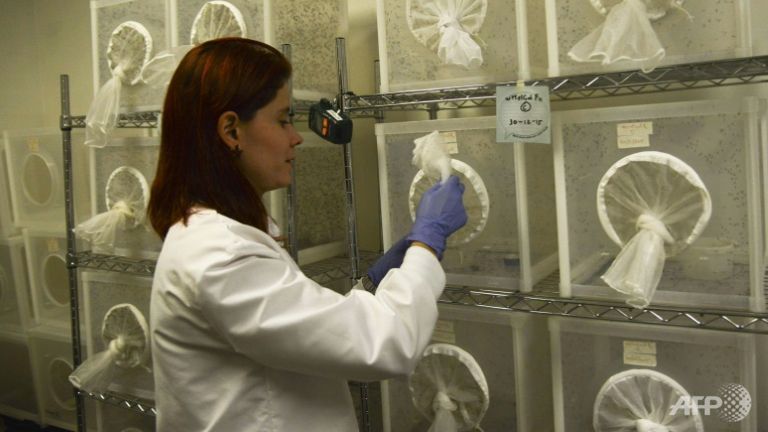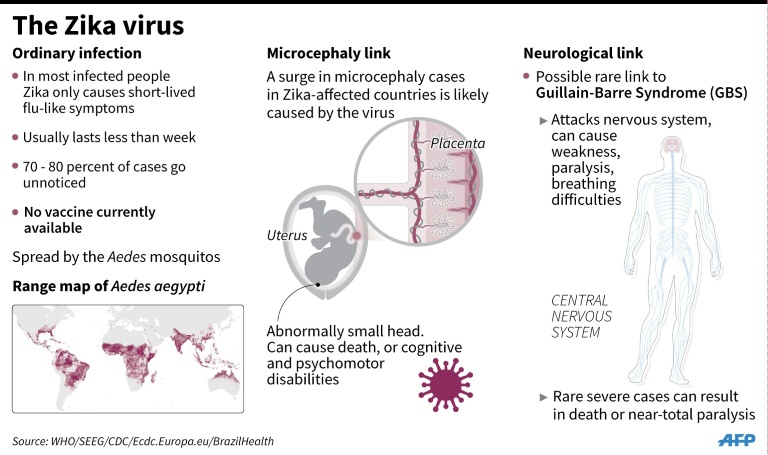No Zika vaccine for another three years: Brazil expert
 |
| WHO said 18 companies and institutes are currently working on Zika vaccines, but human testing has not begun yet. (AFP/Raul Arboleda) |
GENEVA: Global health experts agreed on Wednesday to prioritise developing vaccines against the Zika virus suspected of causing birth defects, but a Brazilian specialist warned that doing so would take at least three years.
"Perhaps in three years we will have a vaccine," Jorge Kalil, head of the Butantan Institute in Sao Paulo, told reporters in Geneva, acknowledging that even that estimate was "optimistic".
He was among global health experts meeting in Geneva since Monday to determine what research and development should be prioritised in the fight against Zika, which has been spreading most rapidly in the Americas.
Zika was previously only known to cause moderate cold and flu-like symptoms, but increasing evidence indicates the virus may be connected to multiple neurological disorders, as well as microcephaly, a severe birth defect in which babies are born with smaller heads and brains.
 |
| Zika infection and its complications. (AFP/Adrian Leung, John Saeki) |
Experts have agreed that efforts should focus on developing vaccines particularly for women of child-bearing age, as well as on creating accurate diagnostic tests and innovative vector control tools to reduce mosquito populations, the World Health Organization said Wednesday.
WHO's deputy director for health systems and innovation Marie-Paule Kieny told reporters work was under way to develop an emergency vaccine "product profile" to help stake out regulatory requirements and help guide developers.
'MONTHS FROM CLINICAL TRIALS'
She said the final profile should be ready in May, but acknowledged that developing a usable vaccine would take much longer.
"Vaccine developement is still at an early stage and the most advanced candidates are still months away from entering early human clinical trials," Kieny said. "It is therefore possible that vaccines may come (too) late for the current Latin American outbreak," she said, stressing though that "the developement of a vaccine remains an imperative."
WHO said on Wednesday that 18 companies and research institutes were currently working on Zika vaccines. None have been tested on humans.
Another 31 labs are working on developing diagnostic tests, the global health body said, with a profile on the needed diagnostic tools expected to be ready by mid-April.
Next week, the WHO is set to convene a meeting of the world's top experts on vector control to determine if a range of radical new methods could also be safely and efficiently used against the Aedes aegypti mosquitos carrying Zika.
Such methods could, according to experts, include releasing genetically modified mosquitos, releasing large numbers of sterilised male mosquitos to halt reproduction, or infecting mosquitos with a bacteria that prevents their eggs from hatching and reduces their ability to transmit the virus.
WHO on Tuesday advised pregnant women not to travel to areas affected by the Zika outbreak, amid mounting evidence the virus causes birth defects.
What the stars mean:
★ Poor ★ ★ Promising ★★★ Good ★★★★ Very good ★★★★★ Exceptional
Latest News
More News
- Foreign leaders extend congratulations to Party General Secretary To Lam (January 25, 2026 | 10:01)
- Russian President congratulates Vietnamese Party leader during phone talks (January 25, 2026 | 09:58)
- Worldwide congratulations underscore confidence in Vietnam’s 14th Party Congress (January 23, 2026 | 09:02)
- Political parties, organisations, int’l friends send congratulations to 14th National Party Congress (January 22, 2026 | 09:33)
- 14th National Party Congress: Japanese media highlight Vietnam’s growth targets (January 21, 2026 | 09:46)
- 14th National Party Congress: Driving force for Vietnam to continue renewal, innovation, breakthroughs (January 21, 2026 | 09:42)
- Vietnam remains spiritual support for progressive forces: Colombian party leader (January 21, 2026 | 08:00)
- Int'l media provides large coverage of 14th National Party Congress's first working day (January 20, 2026 | 09:09)
- Vietnamese firms win top honours at ASEAN Digital Awards (January 16, 2026 | 16:45)
- ASEAN Digital Ministers' Meeting opens in Hanoi (January 15, 2026 | 15:33)
















 Mobile Version
Mobile Version